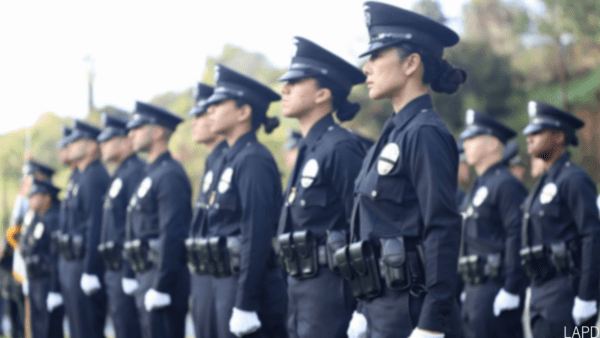 View Winners →
View Winners → Police Commission to review LAPD report on handling of Echo Park protest

The Los Angeles Police Commission Tuesday will review a report from the police department that found some fault for the way the LAPD handled contentious demonstrations in March against the city’s clearing of a large homeless encampment at Echo Park Lake — though the department also placed blame on other city officials as well.
In an after-action report issued Friday, the department said it needs a better system for tracking the use of projectiles on crowds, and for dealing with the rise in independent journalists and “observers,” and may need “a formal policy or specific guidance regarding what actions field supervisors and officers should take when [they] detain someone at the scene of an unlawful assembly.”
At its peak, the LAPD deployed 750 officers to Echo Park to close the park and respond to protests. The cost to pay officers’ salaries and overtime, as well as cost of “services rendered” by the LAPD during the closure on March 24 and 25 was about $1.3 million. The department spent about $740,000 during the cleanup on March 26 and 27.
During the protests, officers reported using five rounds of the 40 mm “less-lethal” launchers, six rounds of the 37mm “less-lethal” launchers and 12 rounds of bean bag “less-lethal” launchers. However, the report says “there is a large gap between the level of documentation that goes into a traditional [non-categorical use of force] incident, and the level of reporting and investigation that accompanies the same type of force used during a crowd control situation.” The report recommends creating a system to document all relevant information when less-lethal munitions are deployed.
During the protests, officers arrested 179 people for failure to disperse. On June 11, the Los Angeles City Attorney Mike Feuer announced that people arrested for failure to disperse would not be charged. Journalists — including the Los Angeles Times’ James Queally and Spectrum News 1’s Kate Cagle — were detained and released shortly after, but two reporters for the nonprofit online outlet Knock L.A. were detained for hours.
The department’s report alleged that “many activists double as online reporters for alternative news sources” and that they “expect to be given free access during crowd control situations, while antagonizing officers and impeding police action.”
The report recommends the department consider publishing “a formal policy or specific guidance” on what officers should do if they arrest an accredited member of the media during an unlawful assembly. The department’s policy states that it should accommodate the media, but it doesn’t have a policy to automatically release them if they are detained during an unlawful assembly.
Adam Rose, chair of the press rights committee for the Los Angeles Press Club, said Monday that the group will ask the police commission not to accept the report, calling it unfinished because the LAPD did not speak to journalists who were detained, arrested, shot with less-lethal munition, and denied access to a news conference.
“This seems like a basic step for any investigation. For now, the report’s discussion of police-press interactions is a rough draft, not a reliable accounting. It doesn’t address potential problems with dispersal orders, safe observation areas, or even an officer’s unprovoked attack on a journalist that was captured on video. There are unsubstantiated claims and mischaracterizations caused by missing context. All of this can be fixed.”
Rose added that he wants law enforcement and the journalism community to work together to protect constitutional rights.
“We’re identifying these problems in good faith and hope that doing so will improve the process of these After Action Reports,” he said.
The report also urges the city to make the full staffing of Park Rangers a top priority and says many of the problems at the March 25 protest might have been avoided if the encampment had not been allowed to grow so large.
“Currently, Park Rangers are missing nearly half their allotted positions. They simply do not have the resources to monitor every park in the city,” the report states.
According to the report, at the time of the protests the Department of Recreation and Parks had 31 rangers assigned to oversee six regional parks and all of the city’s “pocket parks,” such as Echo Park. Park Rangers are sworn peace officers who receive basic police training. They’re authorized to make arrests but do not carry firearms, according to Los Angeles Municipal Code 63.41.
The report said that if the department had more park rangers to control the expansion of the Echo Park encampment, the “full-scale closure” of the park would never have been needed.
Word spread on March 22 that the park would be closed for repairs, but many in the community saw it as a veiled effort to remove the hundreds of unhoused Angelenos who took up residence there. The park underwent $600,0000 worth of cleaning and repairs before reopening to the public on May 26.
The report says the LAPD has initiated 12 personnel complaints for alleged police misconduct connected to the incident.
The report will be discussed at the Police Commission’s 9:30 a.m. meeting, which can be viewed at https://lapd.zoom.us/s/289225944.








































































































